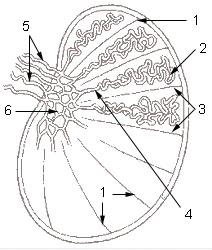Seminiferous tubule
(Redirected from Tubuli seminiferi)
The Seminiferous Tubules are a component of the male reproductive system that are located within the testes. They are the site of the germination, maturation, and transportation of the sperm cells within the male body. The epithelium of the tubule consists of a type of sustentacular cells known as Sertoli cells, which are a crucial part of spermatogenesis.
Structure[edit | edit source]
The seminiferous tubules are a coiled network of tubes that measure up to half a mile in length in each testis. They are lined with a layer of cells that progress through the stages of spermatogenesis to produce sperm. The tubules are surrounded by myoid cells that contract rhythmically to move the immature sperm towards the rete testis for further maturation.
Function[edit | edit source]
The primary function of the seminiferous tubules is the production of sperm. This process, known as spermatogenesis, involves the development of spermatogonia into mature spermatozoa. The process is facilitated by Sertoli cells, which provide nourishment and structural support for the developing sperm cells.
Clinical significance[edit | edit source]
Damage or disease affecting the seminiferous tubules can lead to infertility in males. Conditions such as varicocele, cryptorchidism, and certain genetic disorders can affect the function of the tubules and result in a reduced sperm count or poor sperm quality.
See also[edit | edit source]
Search WikiMD
Ad.Tired of being Overweight? Try W8MD's physician weight loss program.
Semaglutide (Ozempic / Wegovy and Tirzepatide (Mounjaro / Zepbound) available.
Advertise on WikiMD
|
WikiMD's Wellness Encyclopedia |
| Let Food Be Thy Medicine Medicine Thy Food - Hippocrates |
Translate this page: - East Asian
中文,
日本,
한국어,
South Asian
हिन्दी,
தமிழ்,
తెలుగు,
Urdu,
ಕನ್ನಡ,
Southeast Asian
Indonesian,
Vietnamese,
Thai,
မြန်မာဘာသာ,
বাংলা
European
español,
Deutsch,
français,
Greek,
português do Brasil,
polski,
română,
русский,
Nederlands,
norsk,
svenska,
suomi,
Italian
Middle Eastern & African
عربى,
Turkish,
Persian,
Hebrew,
Afrikaans,
isiZulu,
Kiswahili,
Other
Bulgarian,
Hungarian,
Czech,
Swedish,
മലയാളം,
मराठी,
ਪੰਜਾਬੀ,
ગુજરાતી,
Portuguese,
Ukrainian
Medical Disclaimer: WikiMD is not a substitute for professional medical advice. The information on WikiMD is provided as an information resource only, may be incorrect, outdated or misleading, and is not to be used or relied on for any diagnostic or treatment purposes. Please consult your health care provider before making any healthcare decisions or for guidance about a specific medical condition. WikiMD expressly disclaims responsibility, and shall have no liability, for any damages, loss, injury, or liability whatsoever suffered as a result of your reliance on the information contained in this site. By visiting this site you agree to the foregoing terms and conditions, which may from time to time be changed or supplemented by WikiMD. If you do not agree to the foregoing terms and conditions, you should not enter or use this site. See full disclaimer.
Credits:Most images are courtesy of Wikimedia commons, and templates, categories Wikipedia, licensed under CC BY SA or similar.
Contributors: Prab R. Tumpati, MD







